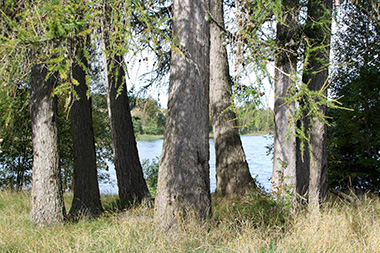EPISODE 1:
FOREST IN PERIL
Introduction to the first episode:
How much time do we have left to find permanent solutions to the problems this world faces:
rising ocean-levels, rising populations, rising levels of CO2, rising temperatures?
And all shortly to be followed by shortages: a shortage of food, a shortage of fresh water,
and above all perhaps, a shortage of space for all the species on our planet to live side
by side in peace and harmony.

End of the first episode:
About a thousand years ago the people of Easter Island in the South Pacific,
the most isolated piece of inhabited land in the world, began carving hundreds of giant
statues, known as moai, then moving them to sacred sites around the coast.
Nowadays tourists from all over the world come to see the statues and to wonder
at the demented frenzy that moved the inhabitants to cut down every precious tree
on the island, turning a beautiful Pacific paradise into a barren, windswept wasteland.
Brief comments on interviewees and geographical locations:
In our search for solutions we are guided by some of the world′s leading experts,
who analyze the planet′s condition as we move from the Pacific to Korea, Sri Lanka,
Indonesia, Scandinavia, America and Easter Island. We meet some extraordinary projects
which, if successful, could all deserve a Nobel Prize.
EPISODE 2:
STRIKING THE RIGHT BALANCE
Introduction to the second episode:
The crisis has been coming for a very long time, but now it has arrived, and time is short.
However the sheer diversity of life on our planet, the infinite variety of species,
the growing numbers of people, the numerous forms of human activity - all this conspires
to make our search for solutions seem almost impossible. Will the human race ever address
the issues with one voice? We listen to some of the voices that are addressing them, voices of
eminent and involved people who are reaching for an answer.
The episode starts on the island of Pentecost, the birthplace of land diving, a tradition
that has been maintained for two thousand years. Nature has been kind here and has, in turn,
been carefully preserved by the island′s people. Taking risks is part of the human condition,
and always has been. But now, at the beginning of the 21st century, not just these islanders,
but mankind as a whole must face the biggest risk of all – nothing less than the destruction
of our world.
Episode Two takes us further, to:
... the Maldive islands – a nation at risk of “diving into the sea”.
The islands′ minister of environment, however, believes in solutions presented at the IUFRO
world congress in Korea. The Green Planet′s journey in Episode Two moves to a land with abundant
water resources – Canada; then to the Nordic countries, and so to Brazil, where we present a
revolutionary new environmental movement called the Atlantic Forest Restoration Pact.
This movement′s contribution to the restoration of the world as a Green Planet is hugely significant,
and it has helped generate the “Bonn Challenge”, whose importance we also underline.
For the first time in many decades we have reason to be optimistic! Darwin′s thrilling report
of what he once saw along the Atlantic coast may be made valid again for our times. But it will
not happen at once. The revolution has just started.
EPISODE 3:
ROAD TO RECOVERY
Introduction to the third episode:
This episode begins on Easter Island where the Thor Heyerdahl expedition moved one
of the giant moai statues using the technique the islanders themselves had used.
The only way of transporting a statue was to wriggle it forward – “it walked”, just as
the elders said. The episode proceeds to China and the Great Wall. Tens of thousands
are walking on the wall, nearly all of them Chinese, dressed in modern clothes. Lester
Brown explains the background for the economic boom in China, and two Chinese women,
called heroines by the Chinese, show the incredible work they have done. One of them,
Mrs. Wei, planted 2 million trees and thereby revived the local economy. Her village
flourished. She was first filmed in 1999 when she was planting saplings on a desert-like plateau,
near the Great Wall. Now, in 2012, the film team returns to Mrs.Wei to see the results.
Only one nation in the world has declared a green future in its constitution: Namibia.
Nelson Mandela gives his views on the importance of a constitution for a nation, and
for the world.
From an Africa “of hope” we return to Easter Island and the
decision taken to bring the forest back. Seeds from one of the island′s l
ast Toromiro trees had been saved by Thor Heyerdahl in 1953 and, thanks to
their successful cultivation at the Gothenburg Botanic Garden, replanting of
the tree begins in 2013. Other tree planting programmes are also in full swing.
Easter Island will be green again. This, one might say, is a micro-scale achievement
. The macro-scale challenge is for the whole world to achieve the same thing –
the restoration of the Green Planet.

